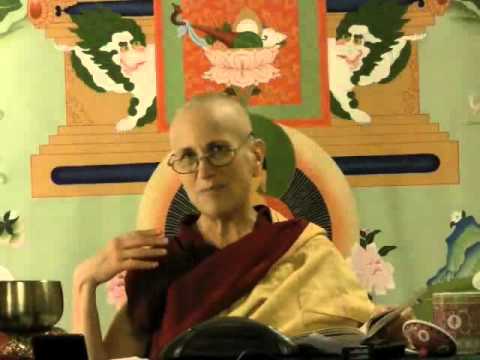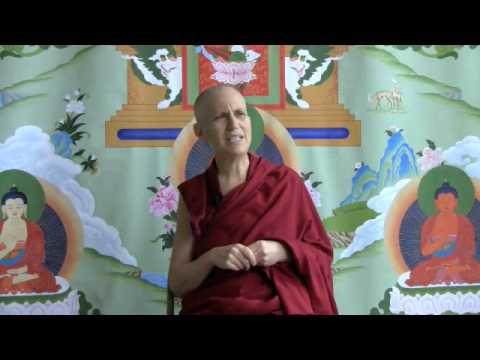Dealing with difficult people
Part of a series of Bodhisattva's Breakfast Corner talks given during the Green Tara Winter Retreat from December 2009 to March 2010.
- A “difficult” person is created by our labeling them so
- We pick out one quality of a person and project our value judgment on it
- We can see the people who disturb our minds as sentient beings who are suffering
Green Tara Retreat 028: Dealing with difficult people (download)
Somebody said, “The past few months, off and on, I’ve been feeling absolutely defeated. Now I understand that part of this is my responsibility because I’ve not been assertive. I work with what I call a crazy-maker, also known as a toxic person. I am certain you may not appreciate these adjectives and I respect that.”
She thinks I don’t know what toxic people are? She thinks nobody criticizes me, nobody gets on my case? [laughter]
She continues, “Yet, how do we not feel defeated when in the presence of a sentient being that behaves in a verbally abusive way, and is a bully? Is there any antidote for this?”
I do have difficulty with the labels “crazy-maker” and “toxic person” just as I do with “delinquent” and “honor student.” Why? Because I think what we do then, is we pick out what we consider to be one quality of a person and we project our value judgment on it. Then we think that’s all the other person is. Somebody else may see the same quality and project a different adjective on it. But we project one and then we think that’s all the whole person is. Just like my objection to the word “criminal.” That’s not their identity in life. This whole idea of “loser” or “honor student” or any of these labels—it isn’t seeing a person as a whole sentient being. It’s only picking out one thing. What happens when we do that is we think that’s all they are, that’s all they ever have been, and that’s all they ever will be. Then that’s how we relate to them. When we relate to them in that way, we make them become like that. Not only in our mind but it also adversely influences the other person if we relate to them according to a very negative stereotypical image that we have.
First of all, when I work with or around somebody who disturbs my mind, or who’s very critical or deprecating, or whatever, I try to see that this is a sentient being who’s suffering. I’m not always successful but I keep coming back and trying to do that—remembering this person has some internal suffering. It’s coming out in their actions, but their actions are not who they are. So I’m not going to label them according to their actions. I’m always just trying to see somebody as a suffering sentient being, just like I am. If I see them that way then there’s possibility for them to change, for me to change, for the relationship to change.
What if you’re with somebody who is completely undermining you, and deprecating you, and so on. Depending upon what the social relationship is with the person, you respond differently. Sometimes the social relationship is one where you can go to the person and say, “When you say these kinds of words, this is how I experience it, this is how I feel.” Or you say, “If you want to work with me, and if we want to work together in a good way, here’s how best to communicate with me. And ‘such and such’ a kind of communication doesn’t work with me because of the way I am. So here are just some hints about how to deal with me.” You can say it in that way. It depends upon the situation.
Some situations you just have to say, “That’s really not appropriate.” Or you have to say, “That kind of talk is getting off topic. We’re here to accomplish this task. Let’s come back and accomplish this task.” Sometimes you just have to dismiss it and act like you didn’t hear it, and then sometimes they just stop doing it. In other words you don’t take it seriously; you just go on as if you never even heard it. So it depends a lot on the specific situation.
But I think the main thing is, in our own heart, maintaining our own sense of confidence and knowing that we have the buddha nature. We have a precious human life. We have refuge. We are making progress on the path. Somebody may say this and they say that, but you know that’s not who we are.
Venerable Thubten Chodron
Venerable Chodron emphasizes the practical application of Buddha’s teachings in our daily lives and is especially skilled at explaining them in ways easily understood and practiced by Westerners. She is well known for her warm, humorous, and lucid teachings. She was ordained as a Buddhist nun in 1977 by Kyabje Ling Rinpoche in Dharamsala, India, and in 1986 she received bhikshuni (full) ordination in Taiwan. Read her full bio.


